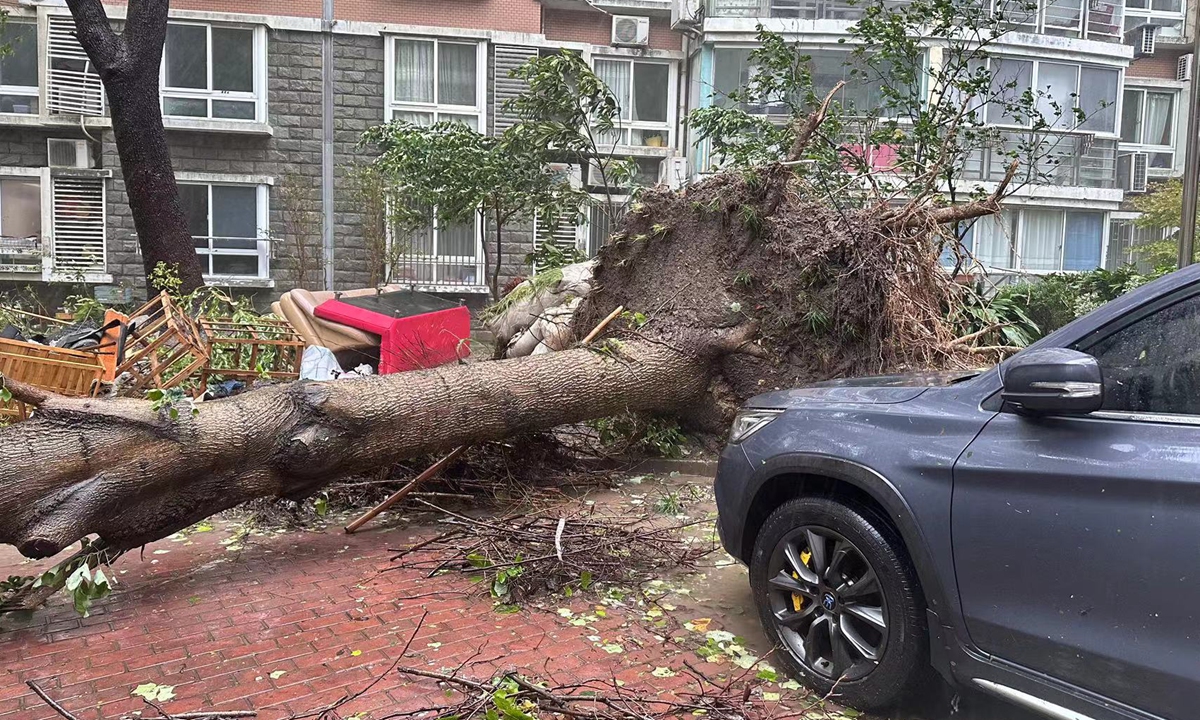East China fully on guard as Typhoon Bebinca hits Shanghai on ...
East China fully on guard as Typhoon Bebinca hits Shanghai on Monday

A tree in Shanghai blown down by strong winds from Typhoon Bebinca on September 16, 2024. Photo: Yu Xi/GT
Several districts in Shanghai, China's financial center, have suspended classes, work and public transportation in the face of Typhoon Bebinca, which could become one of the strongest typhoons to hit the city since 1949. The typhoon landed in Shanghai on Monday.
Shanghai's Pudong, Jinshan, Fengxian and Chongming districts issued notices on Sunday, saying that except for government agencies and enterprises to the city's operations, other employers may implement temporary suspensions of work, operations, flights, park activities and business activities, to prepare for Typhoon Bebinca.
The typhoon, which formed on Saturday night, is expected to make landfall on early Monday between areas north of Qidong in East China's Jiangsu Province and south of Ningbo in East China's Zhejiang Province.
All flights departing or landing at either of Shanghai's two airports - Shanghai Pudong International Airport and Shanghai Hongqiao International Airport - after 8 pm Sunday have been canceled.
A total of 127 inter-provincial bus services from Shanghai to Zhejiang and Jiangsu provinces have been suspended. The suspension range may be further expanded to include all services based on weather warnings and conditions.
As of Monday morning, more than 414,000 people have been relocated in Shanghai. Starting from 1:00 am Monday, Shanghai has implemented closed control on all expressways within the city.
More than 2,500 emergency response teams, 56,000 rescuers and 415 flood control material warehouses are fully prepared and on standby. Moreover, 12,000 firefighting and rescue personnel have deployed and are ready for action.
Shanghai's Yangshan Port has also evacuated all foreign container ships in preparation for the typhoon.
Li, a Shanghai resident, told the Global Times that she was woken up by the sound of rain tapping on her window and strong winds roaring through the city on Monday morning, knocking down trees in her compound.
"I feel like my building was shaking," Li said.
After Sunday night, many netizens in Shanghai said that they couldn't order takeout. Several media reported that they have contacted the delivery platforms and found out due to the impact of the typhoon, takeout and fresh food delivery services in Shanghai had been suspended. The timing for resuming activities will depend on the typhoon's actual impact.
On Sunday, the State Flood Control and Drought Relief Headquarters initiated a Level IV emergency response for flood and typhoon prevention in Anhui Province, while maintaining the Level IV emergency response for flood and typhoon prevention in Shanghai, Jiangsu and Zhejiang.
The headquarters dispatched a working group to Shanghai to assist and guide typhoon prevention efforts, while the previously dispatched working group in Zhejiang continues to work on the front lines.
The Ministry of Emergency Management has mobilized 3,089 engineering rescue personnel, 992 sets of equipment, five helicopters, six drone communication platforms, and 598 social emergency response personnel in key areas such as Shanghai, Jiangsu, Zhejiang and Fujian.
After Typhoon Bebinca makes landfall, it will move further inland. As a result, areas in Shanghai, Zhejiang, Jiangsu and Anhui will experience strong winds and downpour on Monday, with some regions facing torrential downpours.
The city of Haining in East China's Zhejiang Province also warned residents on Monday morning that they should cancel all group activities and schools were asked to suspend classes. All tourists and entertainment venues were closed.
On Monday morning, the expressways in Suzhou, East China's Jiangsu Province were placed under closed management. During the traffic control period, only vehicles for public security, emergency rescue, disaster relief, medical emergencies, essential supplies, and other services related to the national economy and people's livelihoods are allowed to pass.
Global Times









































